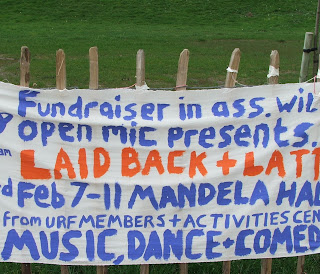It's been claimed that coincidences are the product of heightened attention to a particular thing or experience, and heightened attention is probably to blame for most word-coincidences. For instance, one day when I was (BrE) at university/(AmE) in college, I received a letter from my Irish (AmE) penpal/(BrE) pen friend, in which she related that she'd been on (AmE) vacation/(BrE) holiday in Majorca (and it was a severe disappointment). I had to look up Majorca, since I'd never heard of it before. Later in the day, I went to my avant garde film class and saw Luis Buñuel's L'Age d'Or, in which people run around shouting "The Majorcans are coming! The Majorcans are coming!" (Actually, it was the subtitles that were shouting something like that.) Now, had I really never heard the word Majorca before that day (and thus it was eerily strange to hear it from two unrelated sources), or had I just never noticed it before that day? I'll never know. But I was reminded of this experience when I received an e-mail from reader Tim yesterday.
Prior to receiving his e-mail, I'd been reading the Times Higher Education Supplement (as you do), in which there was an article about UK universities trying to emulate US universities in their fundraising successes. (A very popular discussion in UK higher ed these days--which, frustratingly, usually ignores the fact that the tax incentives for charitable giving are much better in the US than the UK.) The title of the article included the phrase the big ask, and later in the article it refers to "the soliciation--or ask (in US fundraising parlance)" (that "quotation" was from memory--but I think it captures what was said). So, there we have the THES seeming to claim that using ask in this way (as a noun) is an Americanism. The Lynneguist in me thinks: "Bloggable!"
THEN comes the e-mail from American Tim, in which he asks about "BrE" a tough ask, which he'd just read or heard. So, we've got a British newspaper claiming that nominal (=noun) ask is AmE, and an AmE speaker assuming that it's BrE.
THEN, I'm having my Thursday-nightly pizza with my BrE-speaking girlfriends. The Poet, speaking about some emotional trade-offs says, "That's an incredibly huge ask." I thank her for using the word I've been thinking about, and she says "It's certainly not something I heard when growing up. It has a definite foreignness about it" (again--more of a paraphrase than a quotation!).
So, what nationality is nominal ask? Drum roll, please! It's Australian! And not the first time that BrE and AmE speakers have mis-attributed an AusE phrase--although last time the BrE and AmE speakers (myself included!) were all to eager to claim an AusE expression as their own (see back here, but make sure to read the comments to get the whole story).
This is what the OED (in its 2005 draft entry for the 3rd edition) has to say about it:
Read more
Prior to receiving his e-mail, I'd been reading the Times Higher Education Supplement (as you do), in which there was an article about UK universities trying to emulate US universities in their fundraising successes. (A very popular discussion in UK higher ed these days--which, frustratingly, usually ignores the fact that the tax incentives for charitable giving are much better in the US than the UK.) The title of the article included the phrase the big ask, and later in the article it refers to "the soliciation--or ask (in US fundraising parlance)" (that "quotation" was from memory--but I think it captures what was said). So, there we have the THES seeming to claim that using ask in this way (as a noun) is an Americanism. The Lynneguist in me thinks: "Bloggable!"
THEN comes the e-mail from American Tim, in which he asks about "BrE" a tough ask, which he'd just read or heard. So, we've got a British newspaper claiming that nominal (=noun) ask is AmE, and an AmE speaker assuming that it's BrE.
THEN, I'm having my Thursday-nightly pizza with my BrE-speaking girlfriends. The Poet, speaking about some emotional trade-offs says, "That's an incredibly huge ask." I thank her for using the word I've been thinking about, and she says "It's certainly not something I heard when growing up. It has a definite foreignness about it" (again--more of a paraphrase than a quotation!).
So, what nationality is nominal ask? Drum roll, please! It's Australian! And not the first time that BrE and AmE speakers have mis-attributed an AusE phrase--although last time the BrE and AmE speakers (myself included!) were all to eager to claim an AusE expression as their own (see back here, but make sure to read the comments to get the whole story).
This is what the OED (in its 2005 draft entry for the 3rd edition) has to say about it:
colloq. (orig. Austral.) (chiefly Sport). With modifying word or phrase, as a big (also huge, etc.) ask: something which is a lot to ask of someone; something difficult to achieve or surmount. Cf. tall order s.v.Now, the THES article could not have been the first time I'd seen/heard ask, but it was the first time I'd really noticed it. But three times from unrelated sources in a 26-hour period? I think we can claim it as a weird coincidence, can't we?








